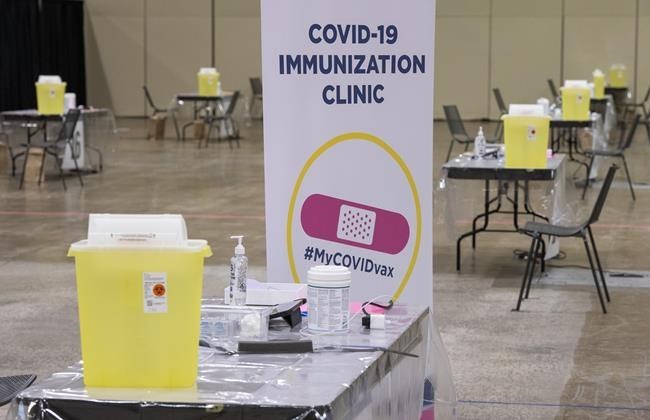OTTAWA — The federal government hopes to start receiving doses of AstraZeneca’s recently approved COVID-19 vaccine this week as the flood of shots that flowed into Canada from Pfizer-BioNTech and Moderna last week partially subsides.
Health Canada announced on Friday that it had approved the AstraZeneca vaccine, the third COVID-19 shot to have received regulatory approval since the start of the pandemic.
Canada has ordered 24 million doses of the vaccine, with the majority to be delivered from the United States between April and September.
But two million jabs have been ordered from the Serum Institute of India, and Verity Pharmaceuticals, which is facilitating the institute’s application in Canada, has said the first 500,000 would reach Canadian shores this week.
A senior government official told The Canadian Press on background Sunday that the first of those doses could start to arrive in Canada as early as Wednesday, though the shipment has not been confirmed.
Dr. Supriya Sharma, the chief medical adviser at Health Canada, also told the CBC on Sunday that the regulator had received additional information over the weekend from Johnson and Johnson, which is seeking approval for its own vaccine. Regulators in the U.S. gave it the green light over the weekend.
Sharma said Health Canada is hoping to approve Johnson & Johnson's vaccine in "the next couple of weeks," but added any decision is contingent on the information presented by the company.
As it stands now, the Public Health Agency of Canada is currently only expecting delivery of about 445,000 vaccine doses this week, which is about 200,000 less than last week’s record high of 640,000 doses in a seven-day period.
The confirmed doses are all coming from Pfizer-BioNTech, as the two companies settle into a rhythm following a month-long delivery lull in January and much of February due to production upgrades in Europe. The pharmaceutical giants have pledged to deliver 4 million doses by the end of March.
Canada received 168,000 doses of Moderna’s vaccine last week, but the company only delivers every three weeks.
Clinical trials showed the AstraZeneca vaccine to be less effective at preventing infection than the other two, but it is still keeping people from getting very sick or dying, Sharma said Friday.
Pfizer and Moderna both reported their products were 95 per cent effective in preventing COVID-19 infections in immunized patients compared to those who received a placebo. Efficacy of the AstraZeneca vaccine is believed to be around 62 per cent.
It’s not entirely clear yet how provinces and territories will incorporate the AstraZeneca vaccine into their inoculation efforts, but the product offers a more flexible option since shots can be shipped and stored in refrigerators rather than freezers.
AstraZeneca vaccines are to be given in two doses between four and 12 weeks apart. Sharma said there is some indication that waiting longer for a follow-up jab leads to a better response, but that data is not yet complete.
There have been some concerns raised about the AstraZeneca vaccine in recent weeks, including its effectiveness against virus variants of concern and whether there is enough data to show it works on older recipients.
Several European countries, including Germany and France, limited AstraZeneca's vaccine to residents under the age of 65.
Sharma said there were a limited number of people over 65 involved in the clinical trials, but that data, coupled with the real-world experience in the United Kingdom, shows strong evidence seniors are protected.
Canada’s vaccine program is ramping up after the lengthy slowdown in deliveries.
More than 300,000 people were vaccinated in the last week, almost one-fifth of the total doses injected since the first immunizations began Dec. 14.
About 700,000 people had received one dose as of Friday afternoon, and more than 500,000 are now fully vaccinated with two doses.
Quebec is set to expand its vaccination effort to the general public on Monday by allowing seniors 85 or older to begin booking appointments. The age threshold has been lowered to 80 for seniors in the Montreal area.
The AstraZeneca vaccine works differently than the other two already in use in Canada.
Both Pfizer-BioNTech and Moderna use messenger RNA technology, using RNA encoded with the piece of the SARS-CoV-2 virus known as the spike protein. The mRNA trains the body to fight off a COVID-19 infection.
AstraZeneca is a viral vector vaccine, which takes a cold virus, modifies it so it can’t reproduce itself, and adds the SARS-CoV-2 spike protein. When injected, it too provokes the body to develop infection-fighting antibodies and cells to combat the virus.
This report by The Canadian Press was first published Feb. 28, 2021.
Lee Berthiaume, The Canadian Press



